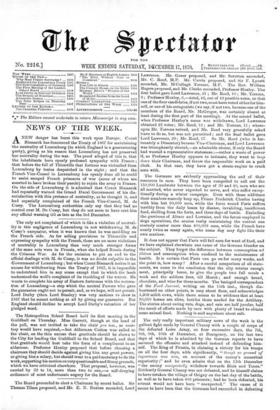The Board proceeded to elect a Chairman by secret ballot.
Sir Thomas 'Ellison proposed, and Mr. E. N. Buxton seconded, Lord
Lawrence. Mr. Gover proposed, and Mr. Scrutton seconded, Mr. C. Reed, M.P. Mr. Currie proposed, and Sir F. Lycett. seconded, Mr. M'Cullagh Torrens, M.P. The Rev. William Rogers proposed, and Mr. Clarke seconded, Professor Huxley. The first ballot gave Lord Lawrence, 21 ; Mr. Reed, 10 ; Mr. Torrens, 9 ; Professor Huxley, 6,—total, 46, out of 49 possible votes, so that one of the four candidates, if not two, must have voted either for him- self, or one of his antagonists (we say, if not two, because one of the members of the Board, Mr. McGregor, was certainly absent at least during the first part of the meeting). At the second ballot, when Professor Huxley's name was withdrawn, Lord Lawrence obtained 22 votes ; Mr. Reed, 13 ; and Mr. Torrens, 11; where- upon Mr. Torrens retired, and Mr. Reed very gracefully asked leave to do so, but was not permitted ; and the final ballot gave Lord Lawrence, 29 ; Mr. Reed, 17. So Mr. Reed (who is for- tunately a Dissenter) became Vice-Chairman, and Lord Lawrence was triumphantly elected,—an admirable choice, if only the Board had wanted a representative statesman ;—rather a waste of power if, as Professor Huxley appears to intimate, they want to keep down their Chairman, and throw the responsible work on a paid clerk. In that case, they have got a steam-engine to crack nuts with.






































